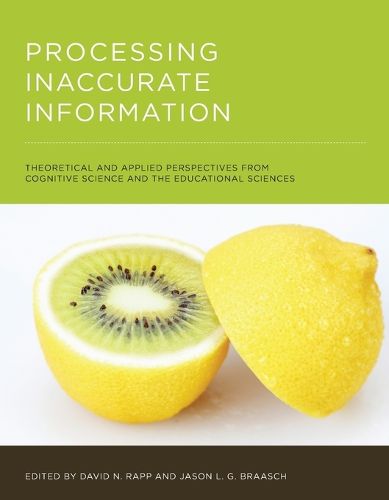Readings Newsletter
Become a Readings Member to make your shopping experience even easier.
Sign in or sign up for free!
You’re not far away from qualifying for FREE standard shipping within Australia
You’ve qualified for FREE standard shipping within Australia
The cart is loading…






Interdisciplinary approaches to identifying, understanding, and remediating people's reliance on inaccurate information that they should know to be wrong.
Interdisciplinary approaches to identifying, understanding, and remediating people's reliance on inaccurate information that they should know to be wrong.
Our lives revolve around the acquisition of information. Sometimes the information we acquire-from other people, from books, or from the media-is wrong. Studies show that people rely on such misinformation, sometimes even when they are aware that the information is inaccurate or invalid. And yet investigations of learning and knowledge acquisition largely ignore encounters with this sort of problematic material. This volume fills the gap, offering theoretical and empirical perspectives on the processing of misinformation and its consequences.
The contributors, from cognitive science and education science, provide analyses that represent a variety of methodologies, theoretical orientations, and fields of expertise. The chapters describe the behavioral consequences of relying on misinformation and outline possible remediations; discuss the cognitive activities that underlie encounters with inaccuracies, investigating why reliance occurs so readily; present theoretical and philosophical considerations of the nature of inaccuracies; and offer formal, empirically driven frameworks that detail when and how inaccuracies will lead to comprehension difficulties.
Contributors Peter Afflerbach, Patricia A. Alexander, Jessica J. Andrews, Peter Baggetta, Jason L. G. Braasch, Ivar Br ten, M. Anne Britt, Rainer Bromme, Luke A. Buckland, Clark A. Chinn, Byeong-Young Cho, Sidney K. D'Mello, Andrea A. diSessa, Ullrich K. H. Ecker, Arthur C. Graesser, Douglas J. Hacker, Brenda Hannon, Xiangen Hu, Maj-Britt Isberner, Koto Ishiwa, Matthew E. Jacovina, Panayiota Kendeou, Jong-Yun Kim, Stephan Lewandowsky, Elizabeth J. Marsh, Ruth Mayo, Keith K. Millis, Edward J. O'Brien, Herre van Oostendorp, Jose Otero, David N. Rapp, Tobias Richter, Ronald W. Rinehart, Yaacov Schul, Colleen M. Seifert, Marc Stadtler, Brent Steffens, Helge I. Str ms , Briony Swire, Sharda Umanath
$9.00 standard shipping within Australia
FREE standard shipping within Australia for orders over $100.00
Express & International shipping calculated at checkout
Stock availability can be subject to change without notice. We recommend calling the shop or contacting our online team to check availability of low stock items. Please see our Shopping Online page for more details.
Interdisciplinary approaches to identifying, understanding, and remediating people's reliance on inaccurate information that they should know to be wrong.
Interdisciplinary approaches to identifying, understanding, and remediating people's reliance on inaccurate information that they should know to be wrong.
Our lives revolve around the acquisition of information. Sometimes the information we acquire-from other people, from books, or from the media-is wrong. Studies show that people rely on such misinformation, sometimes even when they are aware that the information is inaccurate or invalid. And yet investigations of learning and knowledge acquisition largely ignore encounters with this sort of problematic material. This volume fills the gap, offering theoretical and empirical perspectives on the processing of misinformation and its consequences.
The contributors, from cognitive science and education science, provide analyses that represent a variety of methodologies, theoretical orientations, and fields of expertise. The chapters describe the behavioral consequences of relying on misinformation and outline possible remediations; discuss the cognitive activities that underlie encounters with inaccuracies, investigating why reliance occurs so readily; present theoretical and philosophical considerations of the nature of inaccuracies; and offer formal, empirically driven frameworks that detail when and how inaccuracies will lead to comprehension difficulties.
Contributors Peter Afflerbach, Patricia A. Alexander, Jessica J. Andrews, Peter Baggetta, Jason L. G. Braasch, Ivar Br ten, M. Anne Britt, Rainer Bromme, Luke A. Buckland, Clark A. Chinn, Byeong-Young Cho, Sidney K. D'Mello, Andrea A. diSessa, Ullrich K. H. Ecker, Arthur C. Graesser, Douglas J. Hacker, Brenda Hannon, Xiangen Hu, Maj-Britt Isberner, Koto Ishiwa, Matthew E. Jacovina, Panayiota Kendeou, Jong-Yun Kim, Stephan Lewandowsky, Elizabeth J. Marsh, Ruth Mayo, Keith K. Millis, Edward J. O'Brien, Herre van Oostendorp, Jose Otero, David N. Rapp, Tobias Richter, Ronald W. Rinehart, Yaacov Schul, Colleen M. Seifert, Marc Stadtler, Brent Steffens, Helge I. Str ms , Briony Swire, Sharda Umanath